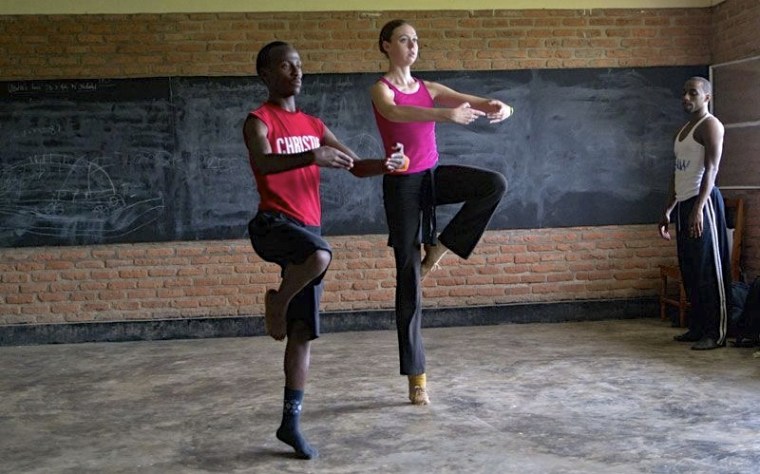The Melissa Harris-Perry Foot Soldier this week quite literally uses her feet--and arms and legs, to be fair--to make a difference.
Rebecca Davis turned her love of dance into a nonprofit organization that promotes ethnic reconciliation among youth in post-genocide countries in Africa and Eastern Europe and connects them with educational opportunities. She is the founder of the Rebecca Davis Dance Company, a professional dance company that performs ballets based on literature and history.
One of the company’s performances focused on Darfur, and sparked Davis' interest in understanding more about post-conflict countries. So she traveled to Rwanda, where her experiences led her change the mission of RDDC to focus on underserved youth in Rwanda, Guinea, and Bosnia-Herzegovina and currently works with over 800 youth per year. I asked Rebecca about that change and the work RDDC does.
After the premiere of the ballet about Darfur you traveled to Rwanda. What happened next?
Experiencing Rwanda, for anyone who’s been there, knows it’s almost impossible to describe properly. The immense devastation-- and yet to see the society recover so remarkably, powerfully and well in such a short period of time is just mind boggling. And yet I see these kids who are living on the streets and have just fallen between the cracks of society. And I could connect with them so quickly because they love to dance and I love to dance.
So I came back to my company and for the next several months it was an internal struggle of: well, I’ve seen this happening in the world and I’ve seen these kids need help, and yet I run a dance company here that uses the tool that can reach those kids. So what can I do differently with my organization in order to provide this type of service to those kids because I think they really need it and no one else is providing it for them?
That eventually led to in 2010 a mission change- closing of the Philadelphia studio in order to free up my time and my dancers time to work internationally and set up programs in the three countries we work now: Guinea, Rwanda and Bosnia.
Tell me about the three countries you picked; how did you pick them?
Dance is just a powerful tool of reaching children; it’s just an incredible equalizer. And working with different ethnicities that have hostilities towards one another, dance is one of the few mechanisms that can be put in place that dispels the separation of ethnicity. So that’s why we started with Rwanda, and the first phases of the program were specifically focused on mixing the Tutsi and Hutu children together.
[In Rwanda the youth we work with] participate in our dance programs three days a week and they have basic computer class IT training twice a week. And the top students are then sponsored to go to boarding school and reintegrated into the formal education system in a school in Rwanda.
In Guinea… we work with street children as well as underserved youth in Guinea in the city of Kindia. The kids have their dance program daily followed by a meal program - there’s severe lack of nutrition in Guinea, dealing with again the state of poverty. And then following the meal program they have a literacy program and then English language.
And in Bosnia, we work in the city called Mostar and here it really is focused on ethnic reconciliation, where we have a program serving Croat children and Bosnian children. And the educational component is social dialogue discussions based on reconciliation.
Why is it important to have people from the local community be involved?
RDDC runs-- the only American on full time contract is me; everyone else is local to the country or a partial contract to come augment the skills abroad. And the type of work the RDDC does is only possible because we have locals leading it in country.
I think that one of the most important things that young students who are aspiring for careers in international development can learn is that… these are not our countries and these are not our children, and we need to listen to the local communities and the local leaders to really understand what’s needed there. And if we have the ability to help them help themselves we should do it. And if we don’t we should move on.
Tell me about the reception to the programs from the children.
The kids have been amazing, which is probably not a surprise. But the reason that our program works and the kids come and they like it is because we’re initially reaching them through dance and dance is non-confrontational; dance doesn’t have the idea of, “I’m teaching you, you listen to me, you have to do everything I say.” Dance is an environment where we do instruct and we do lead, but there’s room for each child to be his own in that environment.
What is in store for your company in the future?
Our goal this year is to raise for the awareness and support for the program in Rwanda because many of our children now are ready to go to boarding school, but we need the secure support for them to actually be sponsored to go to boarding school, which is a really important component for them because that’s the only way that they’ll quit the street life permanently.
When they go to boarding school they have a place to sleep, they have three meals a day, they get a school uniform to wear and they get an education. So that’s kind of the complete solution for these children.
Davis paid a visit to the "Melissa Harris-Perry" set for an interview on Saturday. See the video below.
